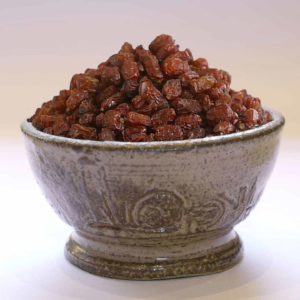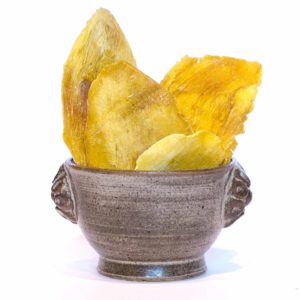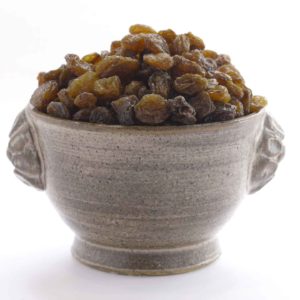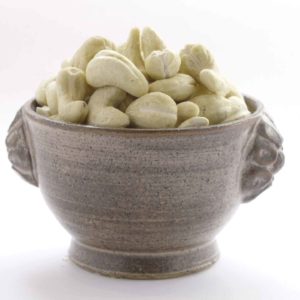0
- ONLINE GROCERY
- OUR HISTORY
- BLOG
- CONTACT
- MY ACCOUNT
- PRO
3,10 €20,50 € /kg
As a snack, raisins can be enjoyed on the go!
For breakfast, they can be added to mueslis, cereals, oatmeal or used in breads and pastries (brioche, raisin bread, etc.).
As an aperitif, you can enjoy it on its own or with other snacks(almonds, cashews, hazelnuts, coconut flakes and/or other dried fruits), in bite-size appetizers (fresh goat's cheese-macadamia-pepper-raisin)...
Produced in the Samarkand region of Uzbekistan, Manuka grapes are thick, non-hybrid grapes. As soft as you'd like, you'll be able to feel its tiny seeds, the sign of a natural, non-genetically modified vine. Cholesterol-free, low in sodium, high in fiber and 100% fat-free, raisins are packed with vitamins. They're an instant source of energy, whether at breakfast or as an afternoon snack when lunchtime is long gone.
History
Grapes, a product of the vine, are one of the oldest known fruits...
Archaeologists agree that the cradle of the first wild vines (Vitis sylvestris) was in the Mediterranean region, and that its fruit, grapes, was eaten by man as early as the Paleolithic era... Then, in the Neolithic period (around 8,000-4,000 BC), in Asia Minor (between the Arabian Gulf and the Black Sea), man began to cultivate vines. The first grape varieties were spread around the Mediterranean by the Phoenicians, Greeks and Romans. Indeed, the Greeks were fervent consumers of wine (as attested by mythology and the cult of Dyonisos or Bacchus...). The Egyptians and Romans also consumed grapes, whether fresh, dried (apyrene varieties - i.e. seedless grapes - have been used since Antiquity to produce raisins) or in the form of wine; the latter greatly contributed to the spread of its cultivation throughout the Empire.
From a rare, ancient variety with an intense, fruity taste, the Manuka grape has enormous berries and 1 or 2 seeds that crunch under the tooth (a crunchy reminder from Mother Nature: all life begins with a seed...). It's in the seeds that the grape's antioxidants are concentrated.
Grapes originate from Uzbekistan. They are gently dried in the sun, preserving their pretty brown color with golden highlights, and their abundance of nutrients. A limited harvest, to favor quality over quantity, makes it a rare and precious product.
Properties
Manuka Raisin can be consumed occasionally or daily, in moderate quantities due to its high carbohydrate content. In this case, do not exceed 30 to 40g of raisins.
Recommended for...
- everyone (children, teenagers, students, pregnant or breastfeeding women, athletes, mobile and sedentary workers, the elderly, vegetarians, vegans, etc.): raisins are a source of flavonoids, antioxidants that neutralize free radicals. It thus helps prevent cardiovascular disease and certain cancers*...
- Sportsmen and women, children, teenagers and students: before, during and after exercise, or at break time, as an alternative to sweets. The phosphorus champion among dried fruits, raisins are a muscle and brain booster, improving physical and intellectual performance (memorization, concentration...). Its calcium and oleic acid content also helps strengthen bones and teeth.
- Pregnant and breast-feeding women: whose energy, protein, lipid, carbohydrate, mineral and fiber requirements are increased (from the second trimester onwards), grapes provide copper, iron, calcium, potassium, magnesium, amino acids, B vitamins, etc.
- the elderly: who often lack appetite or suffer from intestinal sluggishness and are looking for a healthy, easily digestible "sweetness"; grapes are rich in easily-assimilable fiber.
- people who are stressed, tired or anxious: grapes help combat fatigue by rapidly replenishing the body with energy and minerals.
- vegetarians, vegans/vegetarians: for its nutritional benefits. Grapes are a source of copper, iron, manganese, potassium, phosphorus, vitamin B6...
Consumption
Grapes can be used in sauces and vinaigrettes, mixed salads or raw vegetables (endive, grated carrot, grated cabbage, walnuts, grapes), sweet, savory and vegetable fillings, oriental recipes (tabbouleh, couscous, tajines...), meats (foie gras, poultry, pork, beef...), fish (cod, monkfish...), empanadas, pasta, cooked vegetables, cereal side dishes (bulgur, monkfish...).), meats (foie gras, poultry, pork, beef), fish (cod, monkfish), empanadas, pasta, cooked vegetables, cereals (bulgur, millet, semolina...).
Sweeten your dairy products (fromage frais, yoghurt, etc.) and soften your cheese platter (goat's, sheep's, etc.).
Ideal in desserts and pastries: fresh fruit salads, compotes, smoothies, custards, clafoutis, cakes, scones, muffins, cookies, kouglof, rum babas, puddings, Ghriba (Moroccan cake), crumbles, semolina or rice cakes, rice pudding, creams, crème brûlées, crêpes, ice cream or ice cream (rum raisin, for example), homemade cereal or chocolate bars...
Tip: For softer grapes, soak for 1/2 hour in lukewarm water, apple juice or grape juice to rehydrate.
Recommendations
VIJAYA Manuka Grapes should be part of a varied, balanced diet.
However, this product is not recommended in case of :
- diabetic diets,
- hypertriglyceridemia (fructose sensitivity),
- renal insufficiency,
- intestinal disorders.
* Jo JY, Gonzalez dM, Lila MA. Effects of grape cell culture extracts on human topoisomerase II catalytic activity and characterization of active
fractions. J Agric Food Chem. 2005;53:2489-2498
Botany: Vitis vinifera
Origin : Turkey
Ingredients : 100% ORGANIC MANUKA grapes
Shelf life: 200-day guarantee
Quality : ORGANIC
Other names :
Manuka Grapes Nutritional Values
(Per 100 g)
Protein
Carbohydrates
Sugars
Fats
Saturated fatty acids
Salt
| Weight | 50 g |
|---|---|
| Weight | 100g pouch, 250g pouch, 500g pouch, 1000g pouch |
| DLUO | |
| Continent-Country | Asia |




|
L'atelier ferme du 17 au soir au 10 août inclus. Derniers envois le 16 juillet. Vous pouvez cependant passer vos commandes durant cette période pour une expédition dès notre retour. |